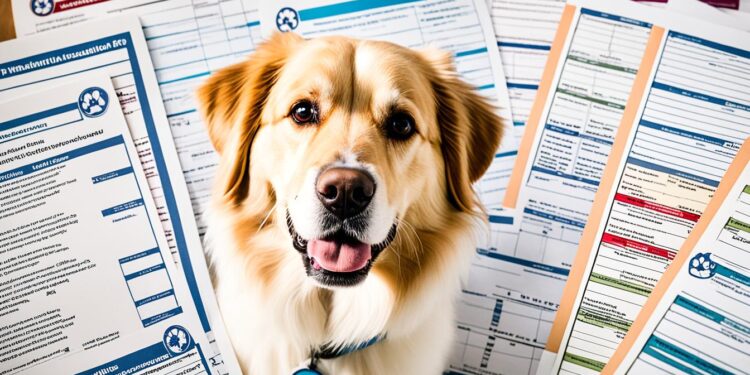Maintaining Up-to-Date Vaccination Records for Your Dog

Ensuring your furry friend’s vaccination records are accurate and current is not just a formality; it plays a crucial role in protecting them from various diseases. In fact, vaccination records for dogs are not only essential for individual pet health but also for preventing the spread of diseases to other dogs and animals. By keeping your dog’s vaccinations up-to-date, you can help safeguard their health and contribute to disease prevention on a larger scale.
Not only that, but an up-to-date vaccination record is often a legal requirement for various activities, such as training classes, boarding, and even travel. Whether you are planning a vacation or a trip to the dog park, having your dog’s vaccination record readily available ensures compliance with regulations and provides peace of mind.
But how do you maintain accurate vaccination records for your furry friend? What information should be included, and how can digital solutions simplify the process? In the next sections, I will provide you with all the information you need to keep your dog’s vaccination records organized and accessible.
Before we dive into the details, let me introduce you to the importance of vaccination records for dogs and how they contribute to your pet’s overall health and well-being. Understanding their significance will further highlight the need for maintaining accurate and up-to-date records for your furry companion.
The Importance of Vaccination Records for Dogs
Vaccination records for dogs are essential for maintaining their health and preventing the spread of diseases to other animals. By ensuring your dog’s vaccinations are up-to-date, you can protect them from serious and potentially life-threatening illnesses. Vaccinations play a crucial role in building your dog’s immune system, enabling them to fight off common canine diseases like parvovirus, rabies, and distemper.
Moreover, vaccination records are not only beneficial for your dog’s individual health but also for participating in various activities. Many places require up-to-date vaccination records for travel, boarding, grooming, or attending public dog areas. These records serve as a quick reference to your dog’s medical history, allowing veterinarians to provide appropriate care in emergency situations or when changing veterinary clinics.
Having accurate vaccination records is part of responsible pet ownership and demonstrates your commitment to protecting your dog’s health and the well-being of other animals in the community. Keeping your dog’s vaccinations up-to-date helps prevent the spread of diseases, contributing to a healthier canine population overall.
Preventing Disease Spread
Vaccination records are crucial in preventing the spread of diseases among dogs and other animals. When dogs are properly vaccinated, they are less likely to contract and transmit contagious illnesses. By reducing the prevalence of diseases in the dog population, we can create a safer environment for all pets.
Additionally, vaccination records play a significant role in controlling outbreaks of diseases with the potential to harm both dogs and humans. Certain diseases, such as rabies, can pose a risk to public health. Vaccination records help authorities track the vaccination status of dogs, ensuring the safety of communities and preventing the spread of preventable diseases.
Whether you’re planning a trip, enrolling your dog in doggy daycare, or simply sharing public spaces with other dogs, having up-to-date vaccination records is essential. It not only protects your beloved canine companion but also promotes a healthier and safer environment for all pets.
How to Maintain Accurate Vaccination Records for Your Dog
Maintaining accurate and comprehensive vaccination records for your dog is essential for their health and wellbeing. By keeping detailed records, you can ensure that your dog receives the necessary vaccinations on time and that their immunization status is up to date.
When maintaining vaccination records for your dog, there are certain key elements that should be included. Each entry should clearly state the name of the vaccine given, the exact date of administration, and whether any booster shots are required. It is also important to include the name and contact information of the veterinarian or clinic that administered the vaccine, note any reactions or side effects, and ensure that each entry is duly signed or stamped.
A vaccination schedule can help you stay organized and ensure that your dog receives all the necessary vaccinations at the appropriate times. It is important to follow the recommended vaccination schedule provided by your veterinarian, as it may vary depending on factors such as your dog’s age, breed, and lifestyle.
Using digital solutions can make record-keeping easier and more efficient. There are various apps and online databases available that can help you track and manage your dog’s vaccination history. When selecting a digital solution, consider factors such as user-friendliness, security measures, and additional features like health tracking and appointment scheduling.
Microchips are another useful tool for maintaining vaccination records. Companies like Peeva offer microchips that not only provide identification for your dog but also store their health records. These microchips consolidate your dog’s health and identification details in one place, making it easier to access and update their vaccination records.
By maintaining accurate vaccination records and following a vaccination schedule, you are taking an important step in protecting your dog’s health and preventing the spread of diseases. Digital solutions and microchips can greatly simplify the record-keeping process, ensuring that your dog’s vaccination history is always up to date and easily accessible.
Remember, by staying proactive and organized with your dog’s vaccination records, you are ensuring their long-term health and wellbeing.
Conclusion
Maintaining up-to-date vaccination records for your dog is a fundamental aspect of responsible pet ownership. It not only protects your dog’s health but also eases veterinary visits, ensures compliance with travel requirements, and can be essential for boarding or other pet-related services.
Whether you choose traditional methods or embrace digital solutions, such as Peeva’s microchip system or vaccination record apps, keeping your dog’s vaccination records organized and accessible is key to their long-term health and wellbeing.
By starting and maintaining an immunization record, staying on schedule with vaccinations, and utilizing available technology, you can ensure that your dog receives optimal care and protection throughout their life. So, take that first step towards responsible pet ownership today by keeping your dog’s vaccination records in check.






